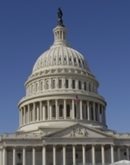
The spread of COVID-19, now officially designated a pandemic by the World Health Organization, has scrambled legislative priorities for both parties and put increasing pressure on Congress and the Trump Administration to act. There will continue to be discussions and likely more legislative initiatives related to COVID-19 in the weeks and months to come.
Emergency COVID-19 Supplemental Appropriations
In early March, Congress quickly put together an emergency spending bill to fund coronavirus response efforts. Congress passed the Coronavirus Preparedness and Response Supplemental Appropriations Act, 2020 on March 5, and President signed it into law a day later.
ASTMH released a statement regarding the supplemental funding. Total funding in the bill is $8.3 billion, with almost $6.5 billion for the Department of Health and Human Services and $1.25 billion for the Department of State and USAID. The remainder goes to the Small Business Administration and the cost of changing telehealth reimbursement policies.
At HHS:
- $3.4 billion goes to the Public Health and Social Services Emergency Fund for purchasing vaccines and other medical supplies. $300 million of this total is a contingency fund that can be tapped if HHS determines there’s a need
- $2.2 billion is for the CDC, including $300 million each for global disease detection and response and the Infectious Diseases Rapid Response Reserve Fund
- $836 million for NIH, focused on the National Institute of Allergy and Infectious Diseases
- $61 million for the FDA
At State and USAID:
- $435 million for global health, including $200 million for the Emergency Reserve Fund
- $300 million in humanitarian assistance funds
- $264 million for State Department diplomatic activities and emergency preparedness
- $250 million for Economic Support Funds to prevent, prepare for, and respond to coronavirus, including to address related economic, security and stabilization requirements.
Criticism of the Administration’s Response
A widespread shortage of coronavirus tests and mixed messages from the Trump Administration have led to an ongoing debate about the effectiveness of the Administration’s response to the coronavirus. Top health officials have contradicted the President on several occasions, and HHS reportedly held classified top-level meetings about the response that excluded public health experts. Congressional Democrats contend that the Administration is more focused on appearances than decisive action. President Trump has repeatedly dismissed COVID-19 as no worse than the seasonal flu.
Next Steps for Congress
House Speaker Nancy Pelosi (D-CA) has moved rapidly to pass follow-up legislation to the emergency funding, this time designed to blunt the economic blow of the pandemic. The package passed the House of Representatives on Friday and as of this writing, is awaiting Senate passage Monday. The package includes supplemental nutrition for those who rely on government programs for some food assistance, expanded Medicaid funding to provide healthcare to more low-income people, broader and free testing coverage, some paid sick leave for workers employed by a midsize company with 50 to 500 employees, expanded unemployment benefits, and tax credits for the self-employed and companies now required to offer paid sick leave. The legislation does not include a temporary payroll tax cut or targeted relief for the airline, cruise or hotel industries, ideas that were floated by President Trump.
COVID-19 Vaccine Development
Sanofi has announced it will work with the Biomedical Advanced Research and Development Authority (BARDA) on a vaccine for COVID-19, while Gilead announced it was providing the anti-Ebola drug remdesivir to hundreds of patients worldwide on compassionate use grounds. Clinical trials in China on remdesivir’s effectiveness against the coronavirus are expected to yield results by April.
Global Health Security Legislation Advances
The House Foreign Affairs Committee unanimously passed H.R. 2166, the Global Health Security Act, on March 4. The bill’s lead sponsors are Rep. Gerry Connolly (D-VA) and Rep. Steve Chabot (R-OH). The bill would require the President to formally establish a Global Health Security Agenda Interagency Review Council, bolster U.S. commitments under the Global Health Security Agenda and designate a permanent coordinator for global health security emergency response.
FY 2021 National Defense Authorization Act (NDAA)
Reports indicate that House Armed Services Committee will consider the House version of the NDAA in late April, while Senate Armed Services will debate its own version in mid-May. The NDAA authorizes important global health research and development programs at the Department of Defense, including the Congressionally Directed Medical Research Program (CDMRP).